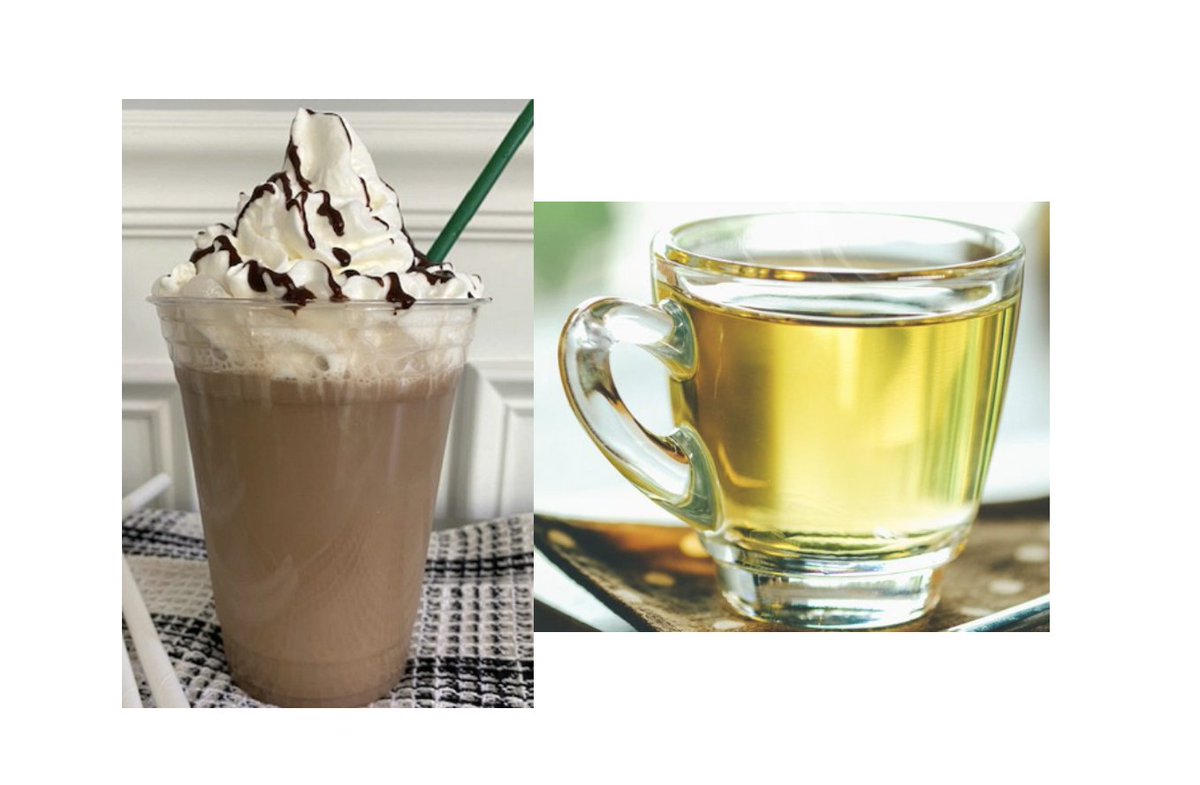
It Depends - Coffee vs Tea
I'm working on a book. One of the chapters will be Coffee vs Tea.
Thought it would be fun to preview some of the content. I'll try turning this into a Tweetorial. (17 in 🧵)
Several polls, several fun facts.
Are you a coffee or a tea drinker?
I'm working on a book. One of the chapters will be Coffee vs Tea.
Thought it would be fun to preview some of the content. I'll try turning this into a Tweetorial. (17 in 🧵)
Several polls, several fun facts.
Are you a coffee or a tea drinker?
Coffee vs Tea and health
Which do you think is a HEALTHIER choice?
2/17
Which do you think is a HEALTHIER choice?
2/17
How many of you paused in trying to answer the previous question thinking.....it depends?
Doesn't it depend on what you add?
Maybe even what type of coffee or tea?
Most common additions, sweetener & dairy
Start with sweetener, do you add:
3/17
Doesn't it depend on what you add?
Maybe even what type of coffee or tea?
Most common additions, sweetener & dairy
Start with sweetener, do you add:
3/17
How about dairy or dairy substitute?
Do you add......?
4/17
Do you add......?
4/17
So, let's say the comparison is between mocha-frappa-crappa-cino, and green tea. Which is healthier?
(no poll, just a picture, assuming everyone gets this one right) 🤣
5/17
(no poll, just a picture, assuming everyone gets this one right) 🤣
5/17

How about black coffee vs. Boba/bubble tea?
Which is healthier?
(again, no poll. Confident you got this one too)
7/17
Which is healthier?
(again, no poll. Confident you got this one too)
7/17

How about mocha-frappa-crappa-cino vs. Bubble tea?
Which do you think is healthier?
Or, do you think this is no longer a question of coffee vs. tea. Isn't this is more of a question of which sugar and dairy delivery system is less unhealthy (double negative intended)? 😱
8/17
Which do you think is healthier?
Or, do you think this is no longer a question of coffee vs. tea. Isn't this is more of a question of which sugar and dairy delivery system is less unhealthy (double negative intended)? 😱
8/17

Obviously context matters.
If we are going to ask whether coffee or tea is healthier, we'd have to provide that additional context of:
"With what?"
And "Instead of what?"
So, let's go head to head, black coffee vs green tea, with no additives
9/17
If we are going to ask whether coffee or tea is healthier, we'd have to provide that additional context of:
"With what?"
And "Instead of what?"
So, let's go head to head, black coffee vs green tea, with no additives
9/17

In the book chapter, I will cover -
Cultural context
Evidence for plausible mechanisms of benefit or harm
Environmental factors
Labeling
...and then revisit the question - Is Coffee or Tea "Better" with more context.
10/17
Cultural context
Evidence for plausible mechanisms of benefit or harm
Environmental factors
Labeling
...and then revisit the question - Is Coffee or Tea "Better" with more context.
10/17

Evidence for plausible mechanisms of benefit or harm:
For coffee this discussion would include components such as caffeine, chlorogenic acid, cafestol and kahweol
11/17
For coffee this discussion would include components such as caffeine, chlorogenic acid, cafestol and kahweol
11/17

Evidence for plausible mechanisms of benefit or harm:
For tea this discussion would include a family of antioxidants.
12/17
For tea this discussion would include a family of antioxidants.
12/17

A 2017 meta-analysis in BMJ concludes coffee is probably healthy.
There is obviously a dose issue.
The conclusion is 3-4 cups/day is optimal.
RCT's lacking.
Who's gonna agree to be randomized to drink it or avoid it for several decades?!
Not me.
Don't hold your breath for RCT.
There is obviously a dose issue.
The conclusion is 3-4 cups/day is optimal.
RCT's lacking.
Who's gonna agree to be randomized to drink it or avoid it for several decades?!
Not me.
Don't hold your breath for RCT.

A 2019 meta-analysis in Mol Nutr Food Res concludes tea is probably healthy.
There's obviously a dose issue
Conclusion is 2-3 cups/d is optimal
RCT's lacking
Who's gonna agree to be randomized to drink it or avoid it for several decades?!
Not me.
Don't hold your breath for RCT
There's obviously a dose issue
Conclusion is 2-3 cups/d is optimal
RCT's lacking
Who's gonna agree to be randomized to drink it or avoid it for several decades?!
Not me.
Don't hold your breath for RCT

For the Eco-Warriors out there, a coffee vs. tea comparison would include consideration of impacts on green house gas emissions, water usage, and more.
(Hint: not much difference between them, according to
Oxfam, 2016, Feeding Climate Change)
15/17
(Hint: not much difference between them, according to
Oxfam, 2016, Feeding Climate Change)
15/17

Possibly helping with the eco-warrior claims and issues, there are various labels used for coffees and teas.
In the book I discuss a bit about verification, use, and cost.
16/17
In the book I discuss a bit about verification, use, and cost.
16/17

For final conclusion you'll have to buy the book (if I ever finish writing it). 🤦♂️
Is Coffee or Tea "Better"?
IT DEPENDS!
With what?
Instead of what?
What dose?
Purpose of the book is to show that controversial nutrition topics are much less so after considering proper CONTEXT.
Is Coffee or Tea "Better"?
IT DEPENDS!
With what?
Instead of what?
What dose?
Purpose of the book is to show that controversial nutrition topics are much less so after considering proper CONTEXT.

• • •
Missing some Tweet in this thread? You can try to
force a refresh










